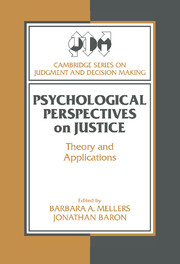Book contents
- Frontmatter
- Contents
- Series preface
- Contributors
- Part I Introduction
- Part II Psychological perspectives
- Part III Economic perspectives
- Fairness in groups: Comparing the self-interest and social identity perspectives
- Heuristics and biases in equity judgments: A utilitarian approach
- Trade-offs in fairness and preference judgments
- Information, fairness, and efficiency in bargaining
- Part IV Variations in perspectives on justice
- Part V Policy perspectives
- Part VI Conclusion
- Name index
- Subject index
Information, fairness, and efficiency in bargaining
Published online by Cambridge University Press: 24 October 2009
- Frontmatter
- Contents
- Series preface
- Contributors
- Part I Introduction
- Part II Psychological perspectives
- Part III Economic perspectives
- Fairness in groups: Comparing the self-interest and social identity perspectives
- Heuristics and biases in equity judgments: A utilitarian approach
- Trade-offs in fairness and preference judgments
- Information, fairness, and efficiency in bargaining
- Part IV Variations in perspectives on justice
- Part V Policy perspectives
- Part VI Conclusion
- Name index
- Subject index
Summary
Economic theory assumes people strive for efficient agreements that benefit all consenting parties. The frequency of mutually destructive conflicts such as strikes, litigation, and military conflict, therefore, poses an important challenge to the field.
Among economists, game theorists have devoted the most attention to inefficiency and have proposed a number of theories to explain why inefficient agreements occur. Most of these revolve around a common theme: Inefficiencies arise because parties possess incomplete information. Bargainers often lack information about how much other parties value an agreement (Babcock, 1991; Hayes, 1984; Tracy, 1987), about the personal characteristics (e.g., impatience) of the other party (Rubinstein, 1985), or the likely consequence of nonsettlement as determined by the ruling of an arbitrator or the existence of other parties willing to make a deal (Priest & Klein, 1984).
Incomplete information impedes settlement for two reasons. First, when bargainers lack information about the other party, they may use the bargaining process to find out the missing information. For example, a union might call a strike to assess management's ability to withstand a strike. Second, when bargainers lack information about the other party's tastes or opportunities, they may overestimate the other party's willingness to make concessions. For example, the seller of a used car may hold out for an unrealistically high price in the erroneous belief that the buyer really likes the car or is impatient to buy it.
- Type
- Chapter
- Information
- Psychological Perspectives on JusticeTheory and Applications, pp. 155 - 180Publisher: Cambridge University PressPrint publication year: 1993
- 27
- Cited by

